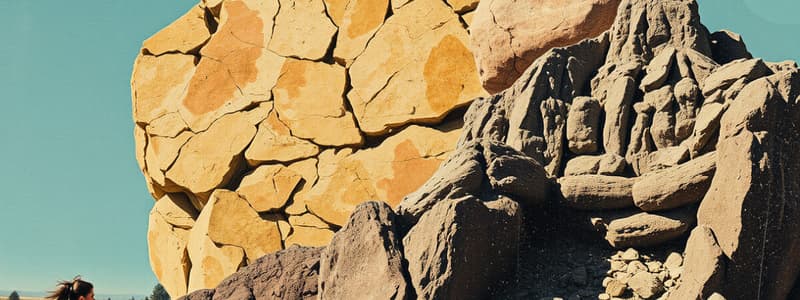Podcast
Questions and Answers
What is the primary process involved in weathering?
What is the primary process involved in weathering?
- It changes the chemical properties of rocks without physical breakdown.
- It involves the alteration of mineral compositions through biological activity.
- It transforms rocks into soil through physical disruption.
- It is the breaking down of rocks and minerals due to atmospheric exposure. (correct)
Which type of weathering exclusively involves physical processes without altering chemical composition?
Which type of weathering exclusively involves physical processes without altering chemical composition?
- Biological weathering
- Chemical weathering
- Thermal weathering
- Mechanical weathering (correct)
Which example is NOT associated with chemical weathering?
Which example is NOT associated with chemical weathering?
- Hydrolysis
- Oxidation
- Freeze-thaw cycles (correct)
- Carbonation
What role does weathering play in an ecosystem?
What role does weathering play in an ecosystem?
Which of the following best describes biological weathering?
Which of the following best describes biological weathering?
Flashcards are hidden until you start studying
Study Notes
Definition of Weathered
-
General Definition: Weathering refers to the process of breaking down rocks and minerals through exposure to atmospheric conditions, leading to changes in their physical and chemical properties.
-
Types of Weathering:
-
Mechanical Weathering:
- Physical breakdown of rocks without changing their chemical composition.
- Examples: freeze-thaw cycles, thermal expansion, abrasion.
-
Chemical Weathering:
- Decomposition of rocks due to chemical reactions, altering the mineral composition.
- Examples: hydrolysis, oxidation, carbonation.
-
Biological Weathering:
- Breakdown of rocks influenced by biological activity.
- Examples: root expansion, lichen growth, microbial activity.
-
-
Importance:
- Leads to soil formation by breaking down parent materials.
- Influences landscape evolution and geological features.
- Affects ecosystems by providing minerals and nutrients.
Definition of Weathered
- Weathering is the breakdown of rocks and minerals from exposure to atmospheric elements, impacting physical and chemical properties.
Types of Weathering
-
Mechanical Weathering:
- Involves physical processes that disintegrate rocks without altering their chemical structure.
- Common mechanisms include freeze-thaw cycles, where water enters cracks, freezes, and expands, causing rock fragmentation, thermal expansion from temperature changes, and abrasion from wind or water movement.
-
Chemical Weathering:
- Involves chemical reactions that lead to the decomposition of minerals, transforming their chemical composition.
- Key processes include hydrolysis, where water reacts with minerals; oxidation, typically involving oxygen that modifies iron-bearing minerals; and carbonation, where carbon dioxide dissolves in rainwater, forming carbonic acid that reacts with minerals.
-
Biological Weathering:
- Driven by biological agents such as plants and microorganisms that contribute to rock degradation.
- Significant examples are root expansion in soil that exerts pressure on rocks, lichen growth that secretes acids to break down surfaces, and microbial activity that can chemically alter mineral structures.
Importance of Weathering
- Facilitates soil formation by breaking down parent rock material into finer particles that can support plant growth and retain moisture.
- Plays a crucial role in the evolution of landscapes and geological formations, influencing topography and soil distribution.
- Contributes to ecosystem health by releasing essential minerals and nutrients into soil and water, making them available for plant and animal life.
Studying That Suits You
Use AI to generate personalized quizzes and flashcards to suit your learning preferences.




